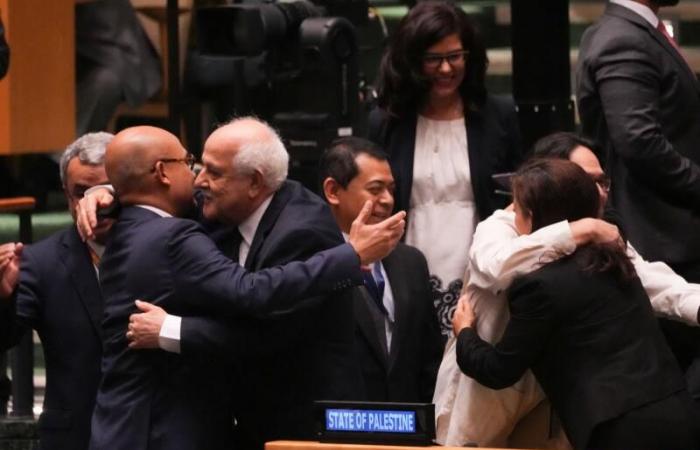The text, adopted by 124 votes in favour, 14 against (including Israel, the United States, Hungary, the Czech Republic, Argentina) and 43 abstentions, “demands” that Israel “end without delay its illicit presence” in the Palestinian territories and that this be done “no later than 12 months after the adoption of this resolution”. The first draft text gave only six months.
A “historic” adoption, hailed the Palestinian mission to the UN on X. A “victory”, according to Hamas, which hailed the “solidarity with the struggle of the Palestinian people”.
Although the General Assembly resolutions are not binding, Israel has denounced the decision as “shameful”.
The Resolution also “demands” the withdrawal of Israeli forces from Palestinian territories, the cessation of new settlements, the restitution of seized land and property, and the possibility of the return of Palestinian refugees.
A Resolution of “great importance” according to the EU
The head of European diplomacy Josep Borrell welcomed a Resolution of “great importance”, which reaffirms the right of the Palestinians to self-determination.
“Israel must immediately heed the demand of the overwhelming majority of UN member states,” said Louis Charbonneau of the NGO Human Rights Watch, which supports an arms embargo on Israel.
Speaking at the Assembly on Tuesday, Palestinian Ambassador to the UN Riyad Mansour called on member states to “choose the right side of history” by supporting the resolution, the first presented on behalf of the observer state of Palestine thanks to a recently won right.
“How many more Palestinians must be killed before change finally occurs to stop this inhumanity?” he asked, a few days before the annual high-level meeting of the General Assembly where the war in Gaza is expected to dominate discussions among dozens of heads of state and government expected.
Israeli massacres undermine any prospect of comprehensive peace
The meeting between the two senior diplomats focused on developments in the Gaza Strip and the West Bank, a spokesman said, as well as the risks that Israel’s war on Gaza poses to regional stability, particularly in light of Israeli calls for an escalation of the conflict with Hezbollah on the southern Lebanon front.
Aboul Gheit warned that “the hatred fostered by Israel through its massacres undermines any prospect of comprehensive peace in the future and threatens to destabilize the framework of peace that has prevailed in the region for more than four decades.”
Wennesland presented his views on efforts to preserve the framework of a two-state solution, including the creation of an independent Palestinian state.
Wennesland and Aboul Gheit discussed anticipated diplomatic initiatives that could advance the two-state solution from a position of mere rhetoric and intentions to tangible actions and implementation.
The Arab League chief stressed the need for continued political engagement across all platforms, especially within the United Nations and its Security Council, in order to support and maintain the two-state vision, stressing that “extending recognition of the Palestinian state is a crucial step in this endeavor, as it facilitates negotiations between the two states on an equal footing, based on legal parity.”






